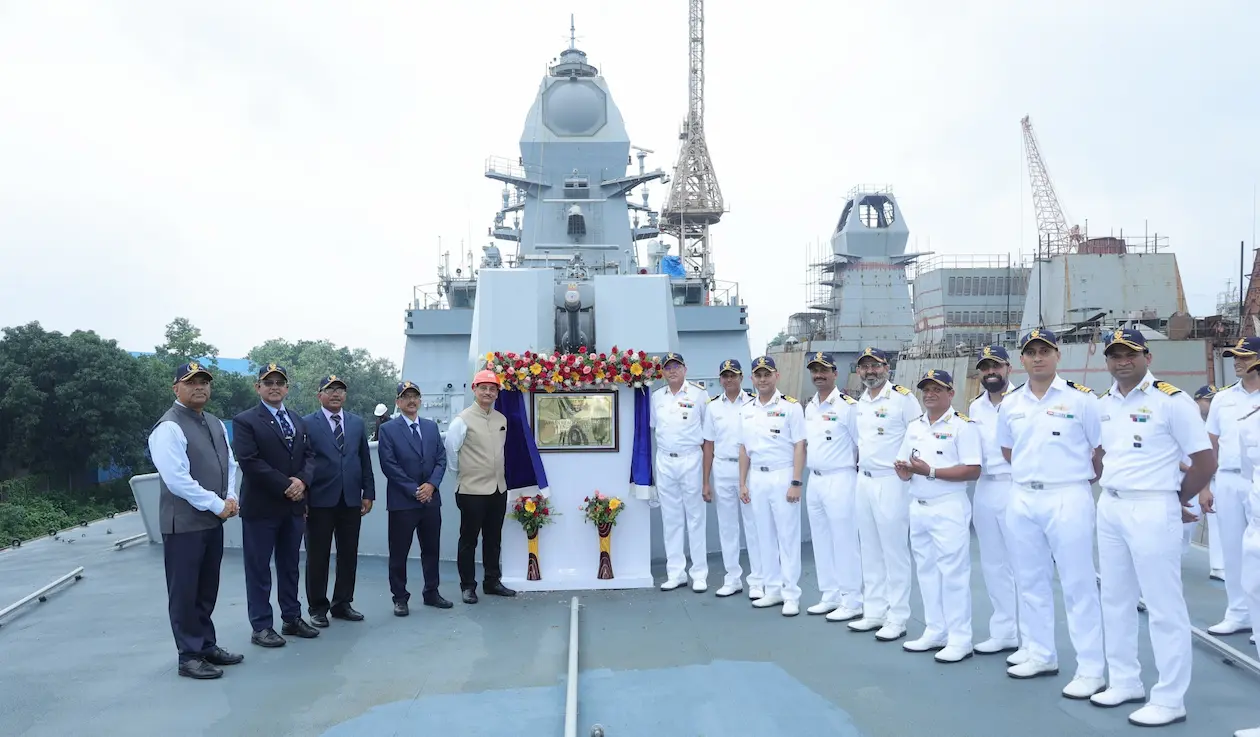
The induction of Himgiri is more than a defense milestone, it’s a symbol of India’s resolve to protect its maritime interests
In a significant boost to India’s maritime defense capabilities, the Indian Navy has officially received its latest indigenous stealth frigate, ‘Himgiri’, under the ambitious Project 17A. Built by Garden Reach Shipbuilders & Engineers (GRSE) in Kolkata, Himgiri is the third of seven multi-role frigates designed to enhance India’s blue-water combat readiness. With growing concerns over Pakistan-China maritime collusiveness, this addition marks a strategic leap in India’s naval preparedness and self-reliance.
Let’s explore the ship’s capabilities, its role in India’s maritime strategy, and the broader geopolitical implications of this naval expansion.
Table of Contents
Project 17A: A Blueprint for Indigenous Excellence
Project 17A is a continuation of the Navy’s push for indigenization, following the success of the earlier Project 17 (Shivalik-class). Under this initiative:
- Seven stealth frigates are being constructed: four at Mazagon Dock Shipbuilders Ltd (MDL) in Mumbai and three at GRSE in Kolkata.
- The total project cost is approximately ₹45,000 crore.
- The first ship, INS Nilgiri, was commissioned in January 2025.
- Himgiri follows Udaygiri, which was handed over by MDL on July 1, 2025.
These frigates are designed to operate in multi-threat environments and are equipped with cutting-edge technology to counter surface, air, and underwater threats.
Himgiri: A Technological Powerhouse
The newly delivered Himgiri is a 6,670-tonne stealth frigate, measuring 149 meters in length, and is packed with advanced sensors, weapons, and automation systems.
Key Features:
- BrahMos Supersonic Cruise Missiles: Extended range of 450 km, capable of precision strikes against enemy ships and coastal targets.
- Barak-8 Surface-to-Air Missile System: Israeli-origin system with a 70 km interception range, effective against aircraft, drones, and incoming missiles.
- Advanced Sonar and Radar Systems: For enhanced situational awareness and threat detection.
- Stealth Design: Reduced radar cross-section for low observability.
- Integrated Platform Management System (IPMS): For automated control of ship operations.
These features make Himgiri a formidable asset in India’s naval arsenal, capable of operating in high-threat zones and supporting strategic missions across the Indian Ocean Region (IOR).
Strategic Importance: Countering Pakistan-China Maritime Nexus
India’s naval expansion comes at a time when Pakistan and China are deepening their maritime cooperation, raising alarms in New Delhi.
Pakistan’s Naval Build-Up:
- Recently inducted PNS Babur and PNS Hunain, enhancing its surface fleet.
- Acquiring Type 054A frigates and Hangor-class submarines from China.
- Increasing presence in the Arabian Sea and Gwadar Port, a key node in China’s Belt and Road Initiative.
China’s Naval Dominance:
- Possesses the world’s largest navy with over 370 warships.
- Expanding footprint in the IOR through dual-use ports in Sri Lanka, Maldives, and Djibouti.
- Regularly conducts joint exercises with Pakistan, signaling strategic alignment.
India’s response is clear: bolster indigenous capabilities, assert dominance in regional waters, and ensure readiness to counter any collusive threat.
Aatmanirbharta in Action: Building Warships at Home
The delivery of Himgiri underscores India’s commitment to ‘Aatmanirbhar Bharat’ (Self-Reliant India) in defense manufacturing.
Indigenous Milestones:
- Over 58 warships currently under construction in Indian shipyards.
- Additional 31 warships in planning stages.
- Investment of over ₹1.2 lakh crore in domestic naval projects.
This not only strengthens India’s defense posture but also boosts employment, technological innovation, and strategic autonomy.
Operational Role: From Deterrence to Power Projection
Himgiri and its sister ships are designed for multi-domain operations, including:
- Anti-submarine warfare
- Air defense and missile interception
- Surface combat and convoy protection
- Maritime surveillance and intelligence gathering
- Humanitarian assistance and disaster relief (HADR)
Their deployment will enhance India’s ability to secure sea lanes, protect trade routes, and respond to regional contingencies.
Naval Doctrine: Shifting from Coastal Defense to Blue-Water Strategy
India’s naval doctrine has evolved from a coastal defense mindset to a blue-water strategy, aimed at projecting power across the IOR and beyond.
Key Objectives:
- Maintain freedom of navigation in critical chokepoints like the Strait of Hormuz and Malacca Strait.
- Counter Chinese naval presence in the Bay of Bengal and Arabian Sea.
- Support Quad initiatives and joint exercises with the U.S., Japan, and Australia.
- Enhance maritime domain awareness through satellite and drone integration.
Himgiri’s induction fits seamlessly into this doctrine, offering versatility and reach.
Future Outlook: What’s Next for the Indian Navy?
India’s naval roadmap includes:
- Next-Generation Destroyers (Project 18): Eight warships with 13,500-tonne displacement and electric propulsion.
- Aircraft Carrier INS Vishal: Under planning, to complement INS Vikramaditya and INS Vikrant.
- Submarine Expansion: Including nuclear-powered and conventional platforms under Project 75I.
These developments aim to build a 175–200 ship navy by the early 2030s, capable of deterrence, diplomacy, and disaster response.
Final Thoughts: A Symbol of Strength and Sovereignty
The induction of Himgiri is more than a defense milestone, it’s a symbol of India’s resolve to protect its maritime interests, assert its strategic autonomy, and counter emerging threats with indigenous strength.
As Pakistan and China deepen their naval ties, India’s answer is clear: build smarter, sail farther, and lead with confidence.
With Himgiri joining the fleet, the Indian Navy sails into the future, not just prepared, but empowered.
Submarine Killer INS Arnala Unleashed: India’s Fearsome Ignites Anxiety Across China and Pakistan